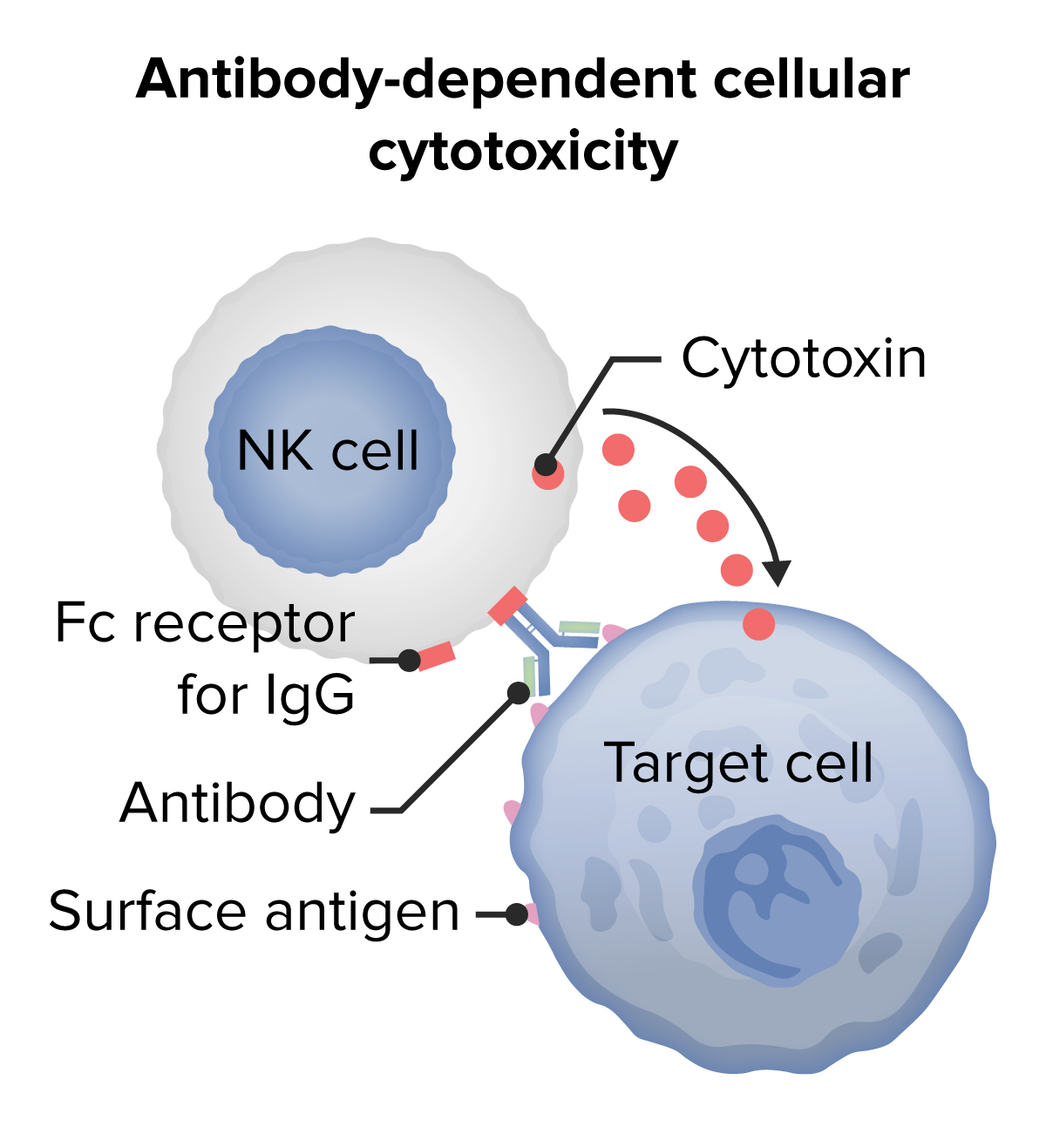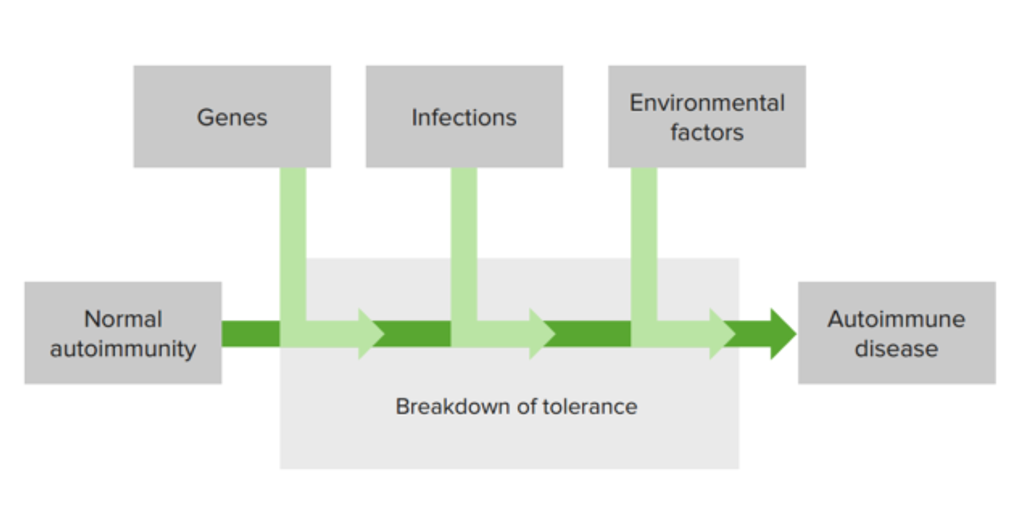Playlist
Show Playlist
Hide Playlist
Autoimmunity
-
Slides Autoimmunity.pdf
-
Reference List Pathology.pdf
-
Download Lecture Overview
00:00 Hello and welcome. 00:02 We're going to finish up our discussion of immune mediated injury by looking at autoimmunity and other forms of immune damage. 00:11 So autoimmunity to begin with, this is where we lose tolerance to self. 00:15 How does that happen? Well, there are probably susceptibility genes you may have in some circumstances. 00:21 A cell that makes too much cytokines or responds to well to particular cytokine stimulation through a receptor polymorphism, you may have a MHC molecule that can bind up particular peptides that someone else doesn't. 00:36 So you have a susceptibility. 00:39 Important that you do not think that that makes you guaranteed to have autoimmune disease. 00:45 In fact, the susceptibility gene just allows you to develop autoreactive lymphocytes or self reactive lymphocytes. 00:53 So for some reason, you don't delete that autoreactive clone. 00:57 Interestingly enough, most of the people walking around, probably have T cells that recognise myelin. 01:05 "What?" You're saying. 01:06 Well, yeah, those are just out in the periphery, though. 01:09 They never really get to set up shop in the brain. 01:11 But you can find in most people a low level of T cells responding to myelin, that could potentially cause multiple sclerosis. 01:20 Okay, regardless of how that actually happens, susceptibility genes allows us to develop these self reactive lymphocytes. 01:29 And they're out there circulating, they are interacting with antigen presenting cells. 01:32 And in the absence of a lot of self antigen from injury or whatever, in the absence of that self antigen, you don't have much activation. 01:41 But if you get local damage, secondary trauma, due to infection due to ischemia, due to any of a variety of injuries, then you will have more local antigen elaborated, you will have greater antigen presentation to T cells, you'll get a clonal T cell expansion. 01:59 And now those T cells through DTH through, cytotoxic T cells, through the production of antibodies, will now cause substantial tissue injury. 02:08 So that's where autoimmunity comes from. 02:12 A good example of this is type 1 diabetes. 02:15 The major underlying mechanism, if we're putting in the type 1, type 2, type 3, type 4 categories, is that this is type 4, delayed type hypersensitivity disease. 02:26 And basically you have an initial loss of self tolerance, those cells are out there, they're circulating. 02:32 And it may be a particular major histocompatibility linkage, as they say it could be receptor expression or receptor activation, just failure to get rid of that autoreactive clone. 02:46 Interestingly enough, if we look at the incidence of diabetes mellitus, type 1 Diabetes mellitus, and MHC identical siblings. 02:55 So it should have similar antigen repertoires, similar ability to respond to antigens, we only find a 12% concordance of type 1. 03:07 And interestingly, even genetically identical twins, siblings, there's only a 36% chance of concordance. 03:15 Meaning that both twins will have type one diabetes. 03:19 This just emphasizes that really important point. 03:22 That it's not just about genetic susceptibility. 03:24 Secondary effects, secondary events such as injury, or toxins, trauma, infections, whatever, are the triggering event that will then drive the final disease. 03:36 So what happens in diabetes mellitus type 1? So this is shown here, the upper panel, on the right hand side shows you normal islets. 03:44 On the lower hand panel, on the right hand side, there is increased mononuclear cell infiltrate in this patient who will go on to develop loss of the beta cells and a type 1 diabetes. 03:57 That injury that's happening there, the lymphocyte and macrophage insulitis, inflammation of the islets is causing a DTH type response. 04:08 There are also cytotoxic T lymphocytes, so we're getting direct cell killing, and we're getting secondary effects due to the elaboration of cytokines and the recruitment of macrophages and other inflammatory cells. 04:22 Again, because the T cells are being activated, those helper T cells are making appropriate cytokines to drive B cell proliferation and the generation of auto antibodies. 04:31 So we can find a number of circulating antibodies that recognise antigens normally present within the islet. 04:39 These auto antibodies are not felt to be causal. 04:42 So they are not the reason that we're getting damaged. 04:45 They're a secondary effect of having activated T cells, of having activated helper CD8+ lymphocytes. 04:54 And the development of those auto antibodies, in many cases, will proceed symptomatology and they do correlate with progression. 05:00 But it can or not felt to be causal. 05:03 So that's just an example of autoimmunity and there are other examples. 05:06 So inflammatory bowel disease, multiple sclerosis, scleroderma, Myathenia gravis, those are all autoimmune diseases and again, predictable consequences of activating the immune response to self antigens.
About the Lecture
The lecture Autoimmunity by Richard Mitchell, MD, PhD is from the course Immune-mediated Diseases.
Included Quiz Questions
The pathophysiology of autoimmunity includes...
- ...delayed-type hypersensitivity triggered by autoreactive lymphocytes.
- ...the collapse of the immune system following a secondary event.
- ...the excessive production of immune mediators.
- ...mast cell degranulation and vasogenic edema.
- ...the formation and deposition of immune complexes.
The pathophysiology of diabetes mellitus type 1 involves...
- ...the generation of autoantibodies against pancreatic islet cells.
- ...pancreatic fibrosis.
- ...the narrowing of the pancreatic duct.
- ...the narrowing of the common bile duct.
- ...the autodigestion of the pancreas.
An example of an autoimmune disease is...
- ...diabetes mellitus type 1.
- ...diabetes mellitus type 2.
- ...hemolytic anemia.
- ...contact dermatitis.
- ...tuberculosis.
An example of an autoimmune condition is...
- ...multiple sclerosis.
- ....Infectious mononucleosis.
- ...influenza.
- ...HIV/AIDS.
- ...megaloblastic anemia.
Customer reviews
5,0 of 5 stars
| 5 Stars |
|
5 |
| 4 Stars |
|
0 |
| 3 Stars |
|
0 |
| 2 Stars |
|
0 |
| 1 Star |
|
0 |





